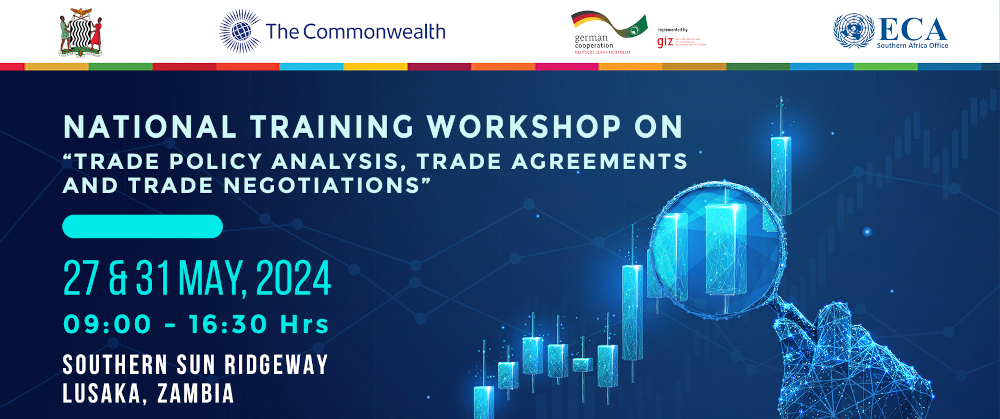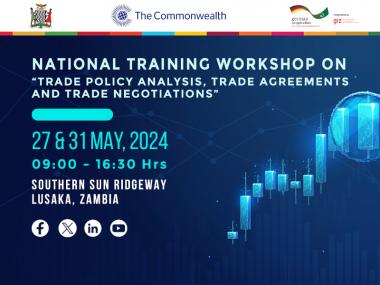
At the request of Zambia’s Ministry of Commerce, Trade and Industry, the Commonwealth Secretariat (COMSEC), the United Nations Economic Commission for Africa (UNECA) and the Deutsche Gesellschaft für Internationale Zusammenarbeit (GIZ) will convene a training workshop for trade officials of the Ministry of Commerce, Trade and Industry (MCTI) and other government officials.
The training workshop aims to strengthen the knowledge, skills and capacities of Zambian trade officials in the areas of international trade theory and evidence, trade policy analysis, trade negotiations, and utilization of trade preferences under multiple trade agreements so as to sharpen their abilities to influence and formulate evidence-based trade policy making for promoting economic transformation and sustainable development in Zambia. In addition, the trade officials will be capacitated in international trade diplomacy and trade negotiations and be aware of trade compliance issues.
The workshop is meant to (i) strengthen the knowledge base of trade officials at MCTI in international trade theory and analysis, (ii) broaden their awareness of regional and global trade negotiations and agreements, (iv) and deepen their understanding of compliance with and utilisation of trade agreements.
Specifically, participants in this course will:
- Understand the position of Zambia in regional and global trade and challenges and opportunities for Zambia to harness trade as a lever for economic transformation and growth;
- Obtain a sound understanding of the basic theory of international trade, trade policy analysis concepts including empirical evidence on drivers and impacts of trade, trade negotiations, issues in trade compliance/implementation, and associated modalities. In turn, they will be able to apply key concepts in their day-to-day work in international trade policy analysis, negotiations, and compliance (bilateral, regional, or multilateral);
- Develop and hone their trade policy analysis and negotiating skills and techniques in developing appropriate strategies and tactics in the conduct of trade policy formulation and negotiations;
- Enhance skills and understanding through short simulation exercises and analysis of case studies, including on ongoing negotiations involving Zambia (bilateral, regional, or multilateral);
- Learn from examples around the world, on how to ensure trade agreements are in the public interest (public and private sector involvement, e.g. through national consultations);
- Identify interests and priorities within various sectors of trade policy and areas for improvement in trade negotiations (bilateral, regional, and multilateral);
- Understand different considerations, factors, advantages and disadvantages associated with virtual and hybrid forms of trade negotiations;
- Clear understanding and compliance with binding obligations specifically under the AfCFTA (Schedules of Tariff Concession, Rules of Origin, Customs Cooperation and Mutual Assistance, Trade Facilitation, NTBs, TBT, SPS, Transit, Trade Remedies).
In addition, the course will support the MCTI, as well as other Ministries, Departments, and Agencies (MDAs) to strengthen institutional capacity in trade policy analysis, negotiations, and compliance.
